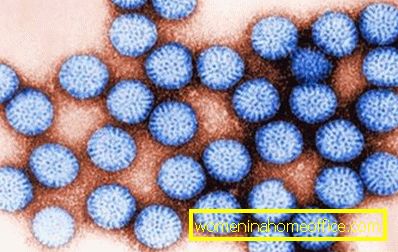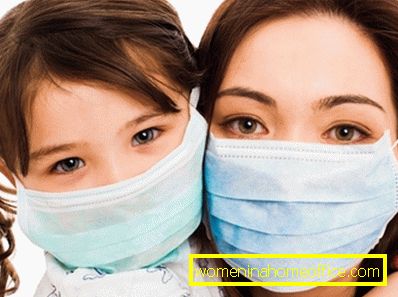Rotavirus infection
Rotavirus infection (or intestinal flu) is an infectious disease caused by rotavirus. The incubation period of infection lasts from 1 to 5 days. Rotavirus is helpless to everyone, so it can be picked up by both a child and an adult. Only in an adult this infection is not as severe as in a child.
An infected person becomes contagious from the first symptoms of the disease and remains infectious until the disease is completely cured. Usually, the patient recovers in 5-7 days, the body produces immunity to infection, and reinfection is almost impossible.
How is rotavirus infection transmitted?
In general, rotavirus infection is transmitted through food, unwashed foods and dirty hands. Rotavirus can be infected in a variety of ways, more often through dairy products. Rotaviruses live well in the fridge, and they do not die from chlorinated water. Just like the flu virus, rotavirus infection can be transmitted by airborne droplets, for example, when sneezing.

Rotavirus infection occurs both in the form of an epidemic, and in some cases. Rotavirus enters the intestinal mucosa, causing inflammation.
Rotavirus infection: symptoms in children
Rotavirus infections are characterized by acute onset of the disease - fever, vomiting, diarrhea, loss of appetite, loss of strength. Often there is a runny nose and sore throat. Rotavirus infection is exacerbated during the flu epidemic, which is why it is called "intestinal flu."
We can distinguish the following stages of the disease in a child: the child wakes up sluggish, naughty, vomiting is possible even on an empty stomach. The child practically eats nothing, and after eating or drinking, he vomits. By evening, the temperature begins to rise, which is difficult to bring down. Gradually, diarrhea and abdominal pain are added to the symptoms.
Since the signs of "intestinal flu" are similar to other serious illnesses (cholera, salmonellosis, or ordinary poisoning), it is better not to delay, immediately consult a doctor and do not self-medicate. For pain in the abdomen of a child, do not give him a painkiller and immediately call a doctor.
Rotavirus infection: symptoms in adults
Adults are less likely to get rotavirus, but still get sick. Often, adults take rotavirus infection for the usual poisoning and do not go to the doctor, swallowing activated charcoal or other absorbent, but this is not correct. In an adult, nausea and vomiting are rarely observed, usually with slight weakness, loss of appetite, fever and diarrhea. But the symptoms do not last long.

More often, "intestinal flu" is symptom-free, despite this, the patient can infect others and family members. The weak flow of rotavirus in adults is due to the strong immunity and good work of the intestinal tract.
How to reduce the temperature during rotavirus infection?
Rotavirus dies at a body temperature of 38 degrees, so do not knock down the temperature below this degree. If the temperature is above 38, doctors prescribe Tsefekon suppositories (for children under 3 years old), older children can be given Paracetamol. The interval between taking the medication should be at least two hours.
Well help to bring down the temperature of a wet wipe with a solution of vodka. You need to wipe the entire body to prevent a temperature drop. After wiping it is necessary to wear cotton socks. For prevention, the doctor may prescribe Enterofuril, No-sils, Baktusubtil and Enterol.
Rotavirus infection in children: treatment
There are no drugs that kill rotavirus, so rotavirus treatment is symptomatic and is aimed at normalizing the water-salt balance. The main goal of treatment is to fight infection.

When symptoms appear, do not give your baby dairy products, so as not to create a favorable environment for the reproduction of bacteria.
Since the child has a reduced appetite during the illness, it is not necessary to force-feed him. Give him homemade jelly or chicken broth. You can also offer liquid rice porridge on the water without oil. Feed your baby in small portions so as not to provoke vomiting.
During the treatment of rotavirus infection in a baby, rehydration therapy is used, and the doctor may prescribe activated charcoal, attapulgitis, etc. When a child has frequent vomiting or diarrhea, it is necessary to fill the volume of fluid and salts in the intestine. To do this, dilute 1 packet of rehydron in 1 liter of water. Give the child to drink the solution strictly in 50 ml every 30 minutes until the water runs out.
Rotavirus infection: treatment in adults
Adults do not need special treatmenteniya, because symptomatic treatment. The main thing is not to contact with children at this time, so as not to infect them.

Rotavirus Infection: Prevention
As a preventive measure, doctors recommend administering a prophylactic vaccine. Currently, there are two vaccines that have passed clinical trials, but they are available only in the US and Europe.
The most important prevention of rotavirus is the observance of sanitary and hygienic norms, i.e. washing hands with soap and using boiled water.